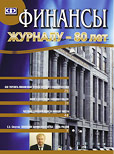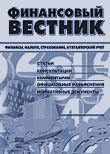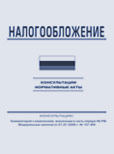Содержание
К 100-ЛЕТИЮ ЖУРНАЛА «ФИНАНСЫ»
E-mail: finance-journal@mail.ru
Отмечено, что хотя отсчет деятельности ведется с выпуска в ноябре 1926 г. первого номера еженедельного журнала «Финансы и народное хозяйство», образованного в результате реорганизации действующих ранее ведомственных периодических изданий в соответствии с принятым Коллегией Наркомата финансов СССР решением, история ведомственного издания Министерства финансов России ведет свое начало с более давних времен. В статье представлена краткая история предшествующих изданий. У руководства журналом, который с 1992 г. издается под названием «Финансы», с самого его основания всегда стояли крупные ученые, известные финансисты, организаторы издательского дела. С самых первых номеров авторами статей были крупнейшие советские, затем российские специалисты проблем теории и практики финансовой сферы. Все годы в журнале работает редакционная коллегия, в которой активное участие принимают представители Минфина, ведущие ученые, руководители финансовых органов. Журнал «Финансы», начиная юбилейный год, продолжает свою деятельность на основе накопленного за многие годы и в разных исторических условиях опыта, укрепляя и преумножая традиции, начало которым было положено в далеком 1865 г., а также развивая новые направления, без которых в современных условиях не может функционировать государство, в том числе цифровизацию и искусственный интеллект.
Ключевые слова: система управления бюджетными расходами, государственные программы Российской Федерации, национальные проекты, обоснования (расчеты) плановых сметных показателей, обоснования бюджетных ассигнований, оценка эффективности расходов федерального бюджета, индивидуальные параметры эффективности.
АКТУАЛЬНО
И.Д. Раковский, и.о. директора Департамента программно-целевого планирования и проектного управления Минфина России, кандидат экономических наук
E-mail: finance-journal@mail.ru
В условиях современных вызовов построение качественной системы управления бюджетными расходами является одной из приоритетных задач. Наличие понятных и измеримых мероприятий (результатов) структурных элементов государственных программ Российской Федерации, увязанных с соответствующими объемами бюджетных ассигнований, является объективным требованием для осуществления качественных процедур управления средствами федерального бюджета. О том, как происходила эволюция подходов к управлению бюджетными расходами, как раз и ведется речь в данной статье.
Ключевые слова: система управления бюджетными расходами, государственные программы Российской Федерации, национальные проекты, обоснования (расчеты) плановых сметных показателей, обоснования бюджетных ассигнований, оценка эффективности расходов федерального бюджета, индивидуальные параметры эффективности.
ФИНАНСЫ И БЮДЖЕТ: ПРОБЛЕМЫ И РЕШЕНИЯ
М.П. Афанасьев, профессор Департамента политики и управления Высшей школы экономики, главный научный сотрудник Института народнохозяйственного прогнозирования РАН, эксперт НИФИ, заслуженный экономист Российской Федерации, доктор экономических наук, профессор
E-mail: mstafan@gmail.com
Н.Н. Шаш, профессор кафедры финансов устойчивого развития Российского экономического университета имени Г.В. Плеханова, доктор экономических наук
E-mail: Shash.NN@rea.ru
В статье отражены особенности федерального бюджета страны на 2026 г. и на плановый период 2027–2028 гг. Рассматриваются такие вопросы, как влияние стратегических детерминант российской бюджетной политики на основные макроэкономические переменные, доходы и расходы бюджета в контексте структурной трансформации национальной экономики, долговая нагрузка и долговая устойчивость Российской Федерации, По мнению авторов, федеральный бюджет на 2026 г. и плановый период 2027–2028 гг. сформирован фактически на основании весьма оптимистичного макроэкономического сценария. Поэтому основные характеристики бюджета выглядят достаточно привлекательно и позитивно, в том числе по сравнению с прошедшим финансовым годом. При этом расходы бюджета прогнозируемо продолжают увеличиваться, и вопрос дефицита бюджета остается крайне актуальным для 2026-го финансового года.
Ключевые слова: федеральный бюджет на 2026–2028 гг., основные бюджетные показатели, бюджетная политика России.
РЕГИОНАЛЬНЫЕ ФИНАНСЫ
М.И. Канкулова, профессор кафедры финансов Санкт-Петербургского государственного экономического университета, доктор экономических наук
E-mail: kankulova.m@unecon.ru
С.С. Алфименко, начальник отдела краткосрочного планирования и анализа исполнения бюджета по расходам Управления казначейства Комитета финансов Санкт-Петербурга
E-mail: salfimenko@yandex.ru
Мониторинг и оценка качества управления региональными финансами, проводимые Минфином с 2011 г. по утвержденной методике, регулярно подвергаются изменениям в части перечня индикаторов и методики их расчета. Результаты комплексной оценки отражают принадлежность каждого региона к группе с высоким, надлежащим или низким уровнем качества. Однако на сегодняшний день мониторинг не играет заметной роли в повышении качества управления государственными финансами на субфедеральном уровне как по причине низкой информативности публикуемых аналитических материалов, так и ввиду неактуальности целеполагания проводимого мониторинга.
Ключевые слова: качество управления региональными финансами, региональные проекты, бюджетное планирование, исполнение бюджета, открытость бюджетных данных.
НАЛОГИ: ТЕОРИЯ И ПРАКТИКА
О.И. Борисов, доцент кафедры налогов и налогового администрирования Факультета налогов, аудита и бизнес-анализа Финансового университета при Правительстве Российской Федерации
E-mail: oborisov@fa.ru
Автор отмечает, что с развитием финансовых отношений и ускорением движения капитала увеличивается разнообразие финансовых и инвестиционных инструментов, которые становятся все более сложными, в результате чего обостряется проблема налоговой квалификации выплат акционерам (участникам) за счет распределения чистой или накопленной прибыли, возврата части уставного (складочного) или добавочного капитала, передачи им бонусных акций самой организации или акций дочерних компаний, образовавшихся при реорганизации бизнеса. Проблема состоит в определении того, в какой степени подобные операции составляют распределение дивидендов, а в какой степени – выплату иных видов доходов.
В статье представлен критический анализ практики зарубежных стран, необходимый для выявления вариативных характерных черт дивидендов и целесообразности корректировки определения в ст. 43 НК РФ.
Проведеённый анализ позволил сделать вывод: исходя из экономической сущности дивидендов их базовой характерной чертой является то, что они представляют собой пассивный доход от акций, долей в капитале или других прав, не являющихся долговыми требованиями и позволяющих участвовать в прибыли организации.
Выделенные автором характерные черты дивидендов составляют основу архитектуры методического инструментария налогообложения дивидендов, позволяют их отличить от иных форм доходов по финансовым инструментам и открывают возможности для дальнейшего совершенствования налогового законодательства.
Ключевые слова: дивиденды, чистая прибыль, уставный капитал, налогообложение, распределение прибыли, источник выплаты дивидендов, налоговые последствия, вариативные черты дивидендов, налоговая квалификация, пассивный доход.
С.В. Никитина, независимый эксперт по налогообложению
E-mail: s-zorya@yandex.ru
В статье рассматриваются проблемы, возникшие у организация и индивидуальных предпринимателей, применяющих УСН в связи с вступлением с 01.01.2025 силу изменений налогового законодательства в части отмены норм об освобождении организаций и индивидуальных предпринимателей, применяющих упрощенную систему налогообложения, от налогообложения налогом на добавленную стоимость. Представлены основные постулаты исчисления НДС у налогоплательщиков, применяющих УСН. Автор, считая, что отдельные нормы НК РФ об исчислении НДС налогоплательщиками, применяющими УСН, являются неоднозначными, совмещающими в себе несовмещаемое. Автор, проанализировав 7 аспектов неоднозначостей, формулирует предложения, направленные на совершенствование налогового законодательства.
Ключевые слова: упрощенная система налогообложения, индивидуальный предприниматель, освобождение от НДС, освобождение от обязанностей налогоплательщика, пониженные ставки, противоречия законодательства, право на применение УСН, методологическая несовместимость, льгота.
СТРАХОВАНИЕ
Т.А. Белоусова, доцент кафедры страхования и экономики социальной сферы Финансового Университета при Правительстве Российской Федерации, кандидат экономических наук, доцент
E-mail: tbelousova@fa.ru
Отмечая, что для Российской Федерации может быть интересен опыт европейских стран в области построения взаимоотношений между частным страховым рынком и государственным сегментом в целях предотвращения и компенсации убытков от последствий реализации климатических рисков, автор показывает, что Страны Евросоюза и Великобритания различным образом решают проблемы обеспечения благосостояния населения в случае угроз значительных ущербов от климатических рисков. Анализируя практику разных стран, автор приходит к выводу, что опыт европейских стран свидетельствует о значительных преимуществах государственной модели страхования рисков изменения климата. Исходя из перспектив развития климатических рисков наиболее эффективным инструментом повышения охвата населения страхованием от экстремальных событий является введение обязательной формы приобретения страхового полиса. При этом сочетание лимитирования размера страховых премий, рассчитанных на основе оценки риска, при условии организации государственно-частного партнерства, может способствовать оптимизации страхового покрытия, адаптации домохозяйств экстремальным событиям, сохранению принципа солидарности.
Ключевые слова: изменения климата, управление рисками крупномасштабных бедствий, компенсация ущерба, страховой рынок, обязательное страхование, климатические риски, франшиза, лимит ответственности, андеррайтинг.
МНЕНИЯ
А.И. Бородин, профессор кафедры финансов устойчивого развития РЭУ им. Г.В. Плеханова, доктор экономических наук
E-mail: aib-2004@yandex.ru
М.С. Гордиенко, профессор кафедры финансов устойчивого развития РЭУ им. Г.В. Плеханова, доктор экономических наук
E-mail: gordienkomikhail@yandex.ru
В статье рассматривается инициатива введения в России технологического сбора – нового неналогового платежа, направленного на поддержку отечественных высокотехнологичных производств. Анализируются цели внедрения сбора (финансирование госпрограмм, выравнивание конкуренции, стимулирование локализации), механизм его взимания (этапы, ставки, администрирование), а также ожидаемые последствия для бизнеса, потребителей и рынка в целом.
Особое внимание уделено международному опыту поддержки высокотехнологичных отраслей: приведены примеры Китая, Южной Кореи, США, ЕС, Индии, Тайваня и Японии. Для каждой страны описаны ключевые инструменты (отраслевые фонды, субсидии, налоговые льготы, прямое финансирование), плательщики, объемы ресурсов и достигнутые результаты. На основе сравнительного анализа сформулированы уроки для России: необходимость сочетания фискальных мер с налоговыми стимулами, важность прозрачности расходования средств, потребность в усилении таможенного контроля и адаптации лучших мировых практик к национальным условиям. Сделан вывод, что технологический сбор может стать эффективным инструментом достижения технологической независимости лишь при условии сбалансированной политики: умеренного фискального изъятия, жесткого контроля за целевым использованием средств и параллельного стимулирования инноваций через льготы и прямую целевую поддержку.
Ключевые слова: технологический сбор; высокотехнологичные отрасли, электронная промышленность, локализация производства, импортозамещение, НИОКР, фискальная политика, неналоговые платежи, промышленная политика, поддержка отрасли.
Content
TO THE 100TH ANNIVERSARY OF "FINANCE" MAGAZINE
E-mail: finsnce-journal@moil.ru
It is noted that although the activity has been counted since the issue in November 1926 of the first issue of the weekly journal "Finance and National Economy," formed as a result of the reorganization of previously existing departmental periodicals in accordance with the decision made by the Collegium of the People's Commissariat of Finance of the USSR, the history of the departmental publication of the Ministry of Finance of Russia dates back to more ancient times. The article presents a brief history of previous publications. The management of the magazine, which since 1992 has been published under the name "Finance," from its very foundation has always been large scientists, well-known financiers, organizers of publishing. From the very first issues, the authors of the articles were the largest Soviet, then Russian experts in the problems of theory and practice of the financial sector. All the years in the magazine there is an editorial board, in which representatives of the Ministry of Finance, leading scientists, heads of financial bodies take an active part. The journal "Finance," starting the anniversary year, continues its activities on the basis of the experience accumulated over many years and in different historical conditions, strengthening and increasing the traditions that began back in 1865, as well as developing new directions, without which the state cannot function in modern conditions, including digitalization and artificial intelligence.
Keywords: Ministry of Finance, periodical, reorganization, financial system, editorial board.
TOPICAL
I.D. Rakovsky, Acting Director of the Department of Program and Target Planning and Project Management of the Ministry of Finance of the Russian Federation, Candidate of Economic Sciences
E-mail: finance-journal@mail.ru
In the context of modern challenges, building a high-quality budget expenditure management system is one of the priority tasks. The availability of understandable and measurable measures (results) of structural elements of state programs of the Russian Federation, linked to the corresponding volumes of budgetary allocations, is an objective requirement for the implementation of high-quality procedures for managing federal budget funds. How the evolution of approaches to budget spending management took place is precisely what is being discussed in this article.
Keywords: budget expenditures management system, state programs of the Russian Federation, national projects, justifications (calculations) of planned estimated indicators, justifications of budget allocations, assessment of the effectiveness of federal budget expenditures, individual efficiency parameters.
FINANCE AND BUDGET: PROBLEMS AND SOLUTIONS
M.P. Afanasyev, Professor, Department of Policy and Management, Higher School of Economics, Chief Researcher, Institute of Economic Forecasting, Russian Academy of Sciences, NIFI expert, Honored Economist of the Russian Federation, Doctor of Economics, Professor
E-mail: mstafan@gmail.com
N.N. Shash, Professor, Department of Sustainable Development Finance, Plekhanov Russian University of Economics, Doctor of Economics
E-mail: Shash.NN@rea.ru
The article reflects the peculiarities of the federal budget of the country for 2026 and for the planning period 2027-2028. Such issues as the impact of the strategic determinants of Russian budgetary policy on the main macroeconomic variables, budget revenues and expenditures in the context of the structural transformation of the national economy, debt burden and debt sustainability of the Russian Federation are being considered. According to the authors, the federal budget for 2026 and the planning period 2027-2028 is actually formed on the basis of a very optimistic macroeconomic scenario. Therefore, the main characteristics of the budget look quite attractive and positive, including compared to the past fiscal year. At the same time, budget expenditures predictably continue to increase, and the issue of budget deficit remains extremely relevant for the 2026th fiscal year.
Keywords: federal budget for 2026-2028, main budget indicators, budget policy of Russia.
REGIONAL FINANCE
M.I. Kankulova, Professor, Department of Finance, St. Petersburg State University of Economics, Doctor of Economics
E-mail: kankulova.m@unecon.ru
S.S. Alfimenko, Head of the Department of Short-Term Planning and Budget Analysis for Expenditures of the Treasury Department of the St. Petersburg Finance Committee
E-mail: salfimenko@yandex.ru
The selection of indicators included in Ministry of Finance's monitoring and assessment of regional financial management quality, conducted since 2011 according to an approved methodology, is regularly being changed as well as variable used for calculation. The results of comprehensive assessment show each region's classification as having a high, adequate, or low level of financial management quality. However, by now monitoring does not play a significant role in improving the quality of public financial management at the sub-federal level, both due to the low information content of published analytical materials and insufficient targeting of the monitoring activities.
Keywords: regional financial management quality, national projects, budget planning, budget execution, budget data transparency.
TAXES: THEORY AND PRACTICE
O.I. Borisov, Associate Professor, Department of Taxes and Tax Administration, Faculty of Taxes, Audit and Business Analysis, Financial University under the Government of the Russian Federation
E-mail: oborisov@fa.ru
The author notes that with the development of financial relations and the acceleration of capital flows, the variety of financial and investment instruments is increasing, which are becoming more complex, as a result of which the problem of tax qualifications of payments to shareholders is aggravated (participants) through the distribution of net or accumulated profit, the return of part of the authorized (stock) or additional capital, transfer to them of bonus shares of the organization itself or shares of subsidiaries formed during the reorganization of the business. The problem lies in determining to what extent such operations constitute the distribution of dividends, and to what extent - the payment of other types of income.
The article presents a critical analysis of the practice of foreign countries, necessary to identify the variable characteristics of dividends and the feasibility of adjusting the definition in Art. 43 of the Tax Code of the Russian Federation.
The analysis made it possible to conclude that based on the economic essence of dividends, their basic characteristic is that they represent passive income from shares, equity shares or other rights that are not debt requirements and allow them to participate in the profit of the organization. The characteristic features of dividends identified by the author form the basis of the architecture of the methodological tools for taxation of dividends, make it possible to distinguish them from other forms of income on financial instruments and open up opportunities for further improvement of tax legislation.
Keywords: dividends, net profit, authorized capital, taxation, profit distribution, source of dividend payment, tax consequences, variable features of dividends, tax qualifications, passive income.
S.V. Nikitina, independent expert on taxation
E-mail: s-zorya@yandex.ru
The article examines the problems that have arisen for the organization and individual entrepreneurs using the simplified tax system in connection with 01.01.2025 entry into force of changes in tax legislation regarding the abolition of the rules on exemption of organizations and individual entrepreneurs using a simplified taxation system from value added tax. The main postulates of VAT calculation for taxpayers applying the simplified tax system are presented. The author, believing that certain norms of the Tax Code of the Russian Federation on the calculation of VAT by taxpayers applying the simplified tax system are ambiguous, combining the non-offset. The author, having analyzed 7 aspects of ambiguity, formulates proposals aimed at improving tax legislation.
Keywords: simplified taxation system, individual entrepreneur, exemption from VAT, exemption from taxpayer duties, reduced rates, contradictions of legislation, the right to apply the simplified tax system, methodological incompatibility, benefit.
INSURANCE
T.A. Belousova, Associate Professor, Department of Insurance and Social Economics, Financial University under the Government of the Russian Federation, Candidate of Economic Sciences, Associate Professor
E-mail: tbelousova@fa.ru
Noting that the Russian Federation may be interested in the experience of European countries in building relationships between the private insurance market and the state segment in order to prevent and compensate for losses from the consequences of the implementation of climate risks, the author shows that the EU countries and the UK solve the problems of ensuring the well-being of the population in different ways in case of threats of significant damage from climate risks. Analyzing the practice of different countries, the author concludes that the experience of European countries indicates significant advantages of the state model of climate change risk insurance. Based on the prospects for the development of climatic risks, the most effective tool for increasing the coverage of the population with insurance against extreme events is the introduction of a mandatory form of acquiring an insurance policy. At the same time, the combination of limiting the amount of insurance premiums calculated on the basis of a risk assessment, subject to the organization of a public-private partnership, can help optimize insurance coverage, adapt households to extreme events, and preserve the principle of solidarity.
Keywords: climate change, large-scale disaster risk management, damage compensation, insurance market, compulsory insurance, climate risks, deductible, liability limit, underwriting.
OPINIONS
A.I. Borodin, Professor, Department of Finance, Sustainable Development, PRUE G.V. Plekhanov, Doctor of Economics
E-mail: aib-2004@yandex.ru
M.S. Gordienko, Professor, Department of Finance, Sustainable Development, Plekhanov Russian University of Economics, Doctor of Economics
E-mail: gordienkomikhail@yandex.ru
The article examines the initiative to introduce a technological levy in Russia – a new non-tax payment aimed at supporting domestic high-tech manufacturing industries. The study analyses the objectives of implementing the levy (funding government programmes, levelling the 2 competitive field, promoting localisation), the mechanism of its collection (stages, rates, administration), as well as the expected impacts on businesses, consumers, and the market as a whole. Special attention is given to international experience in supporting high-tech industries: examples from China, South Korea, the USA, the EU, India, Taiwan, and Japan are provided. For each country, key instruments (sectoral funds, subsidies, tax incentives, direct funding), payers, resource volumes, and achieved outcomes are described. Based on comparative analysis, lessons for Russia are formulated: the need to combine fiscal measures with tax incentives, the importance of transparent spending, the necessity to strengthen customs control, and the adaptation of best global practices to national conditions. The conclusion is made that the technological levy can become an effective instrument for achieving technological independence only under a balanced policy: moderate fiscal extraction, strict control over the targeted use of funds, and parallel stimulation of innovation through incentives and direct targeted support.
Keywords: technological levy, high-tech industries, electronics industry, production localization, import substitution, R&D (research and development), fiscal policy, non-tax payments, industrial policy, industry support.













